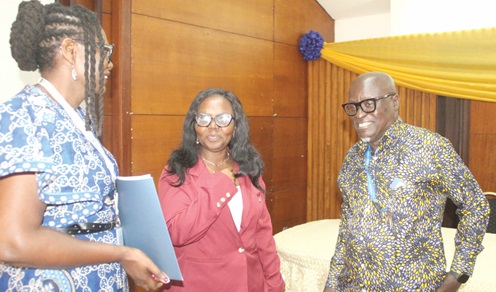
Vaccine to fight diarrhoea in children impactful — Expert
The introduction of the rotavirus vaccine into the country to prevent severe diarrhoea in children has been impactful, a renowned expert in rotavirus research in Africa, Professor George Enyimah Armah, has said.
He said before the introduction of the vaccine in Ghana in 2012, the country was losing an estimated 8,000 children to death every year due to diarrhoea, however, the introduction of the vaccine had witnessed a significant drop of more than 58 per cent of children being sent to the hospital for diarrhoea.
Pointing out that the drop had been continuous year-round, Prof. Armah said in the past, between October to December, which were considered peak rotavirus season, many children were sent to hospital emergencies with the virus but the vaccine's introduction had curbed the incidence.
He has, therefore, advised parents to vaccinate their children to prevent them from getting severe diarrhoea.
Professor Armah, who is the head, the West African World Health Organisation Regional Rotavirus Reference Laboratory, said this in the first of a series of lectures planned in October this year by the Noguchi Memorial Institute for Medical Research (NMIMR) as part of its 45th anniversary.
Rotavirus vaccine
Rotavirus is a very contagious virus that causes diarrhoea.
It causes common symptoms such as watery stool and vomiting, especially in children.
The rotavirus vaccine protects against rotavirus.
In Ghana, babies receive three doses of the vaccine. The first dose is given when they are six weeks; the second at 10 weeks and the third dose is administered when they are 14 weeks.
Anniversary lecture
Prof. Armah, whose lecture was on: ‘Rotavirus vaccine research and impact in Ghana,’ is the longest-serving member of the NMIMR studying diarrhoea and rotavirus in Africa.
Due to his extensive research in this area, the country saw the need to add the Rotavirus vaccine to its Expanded Programme on Immunisation (EPI).
His presentation also touched on how Ghana and Africa got introduced to the rotavirus vaccine and the role he played. He called on Ghana to make scientific research key if it wanted to progress.
Explaining, he said that out of hundreds of scientific research carried out, two of them might probably give the country products that could have a lot of economic impacts, adding that investing in research and people was key.
He mentioned some of the challenges he encountered while working on his rotavirus research to include the fact that a lot of the things they used had to be imported because the country was not able to manufacture them.
He said because the things were costly to import, they sometimes wrote sponsorship proposals outside. Unfortunately, he said when such proposals go through and they import the items, it takes as long as four months to clear them because of difficulty in getting tax clearance.
“We made orders in April for some of the critical things that we use for our research. But as of now, we haven't had the tax clearance. And so we don't have those things. So those are the issues,” he said.
Lecture series
The Director of the NMIMR, Professor Dorothy Yeboah-Manu, who opened the lecture series, said over the past 45 years of its establishment, senior scientists and staff of the NMIMR had worked hard to ensure that the very objective for which Japanese scientist, Noguchi, came to Ghana, was kept.
She said the institute had over the years been a leader in terms of several global health interventions while for Ghana, it had spearheaded public health interventions.
